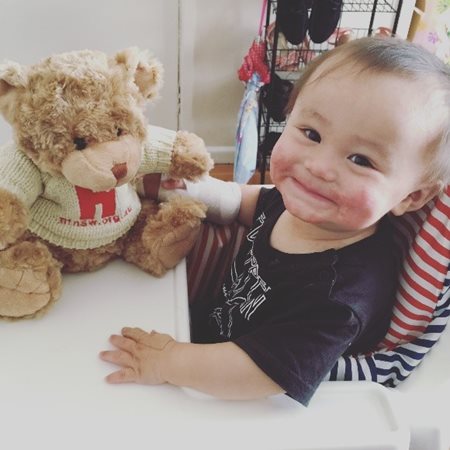This article is adapted with permission from the blog published on Mindipalm.com on 23 August 2017. Photos: Mindi Palm
MINDI PALM
Mindi Palm is an Australian community member

On the 17th September, 2015, our son Elias was diagnosed with haemophilia. At the time, he was still a baby and only nine months old. We didn’t even know there was such a thing as a bleeding disorder until that day the Haemophilia Treatment Centre (HTC) staff terrified us with their textbook medical talk. In simple terms, they told us we got a bleeder as I made a mental note of the words ‘incurable’ and ‘lifelong’, which I would have to get clarification on at a time when I wasn’t so hysterical. That day, we learnt that Elias has a rare blood disorder where he is missing the ‘factor’ that makes his blood clot when he has a cut or bruise.
Coming to terms with Elias’ blood disorder as well as managing and preventing any slips, trips and falls became my next mission. I was on high alert 24/7, waiting to see what accidents would happen. Understanding how this disorder would play out meant a tough year lay ahead for our family. There were many trips to our HTC that year, which is conveniently located only 10 minutes away (including the drive through Maccas that was required for sustenance). The first year was definitely the most challenging, as it would be for any parent managing a health condition. However, we have found over time his disorder to be very manageable.
Due to the first-class management and treatment of Elias at our local HTC coupled with the ongoing support and information we received from Haemophilia Foundation Australia (HFA) and HFNSW, the condition has never been more than a slight inconvenience to us. If I could sit Elias down and ask him directly for comment (he’s two), he would blabber something about not even noticing he had a disorder, because his life is comparable to any other toddler boy. We often forget about it until someone asks how he’s going and we realise he’s growing so fast without any hindrance to his social or physical development.
Haemophilia Foundation NSW holds an annual Haemophilia Family Camp for its members, where families connect with other people living with bleeding disorders. It is run by Tony Wilkinson, who does a fantastic job in running this program to help children and those affected gain self-confidence, form new friendships and develop resilience. There are also educational sessions lead by HTC health professionals and youth mentors. We have attended each year since Elias’ diagnosis, and it’s a wonderful opportunity to catch up with other families and just enjoy some recreation time.
Recently, I found out through genetic testing that I am a carrier of the gene. In general chit-chat, our HTC doctor told me the genetic test results came in and I’m the genetic link. Surprise! Actually, I didn’t feel surprised, worried or upset at all. Many women upon finding out they are a carrier can feel guilty, overwhelmed, angry and a mix of negative emotions. Really, there’s no right or wrong way to react, as everyone is different. Today, the medical field have an abundance of knowledge about haemophilia, with more research carried out each year.
So now that the lab has spoken and following several weeks of family planning, we have our mission set to Operation Baking of Baby, knowing that if we bake a boy, there is a 50/50 chance of him having haemophilia and a 100% chance of him being delicious. If we have a girl, there is a 50/50 chance that she will be a carrier and may or may not also have mild haemophilia. There is an equally high probability of deliciousness too.
I am currently tipping into my second trimester with baby #2, and in a few weeks, we will find out the gender. The place of birth will be at our local public hospital where the adult HTC is located, and our HTC will work with the obstetric team in developing a birthing plan appropriate for a baby with haemophilia. As we had no knowledge whatsoever of Elias’ condition at the time of his birth, forceps were used during delivery. We were lucky there was not a subsequent head bleed, and in general he was a healthy baby! This time round we have all our reinforcements in place (pretty much an army) to help plan and recommend safe birthing methods, as well as supply factor and support. We’re in good hands!
For those parents who have received the news of a haemophilia diagnosis for their son, relative or loved one, I encourage you to get as acquainted with the HTC staff, the Haemophilia Foundation and support network as much as possible. Over time, you will come to trust their knowledge and expertise, whilst having the challenging yet rewarding privilege of helping a child to live an abundant life without limits.
Haemophilia Foundation Australia acknowledges the Traditional Owners and Custodians of Country throughout Australia, the land, waters and community where we walk, live, meet and work. We pay our respects to Elders past and present and extend that respect to all Aboriginal and Torres Strait Islander peoples.
Sign up for the latest news, events and our free National Haemophilia magazine